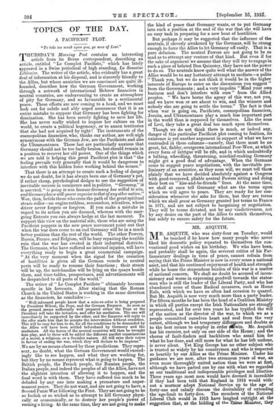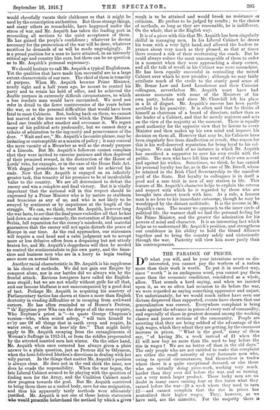MR. ASQUITH.
MR. ASQUITH, who was sixty-four on Tuesday, would be touched if he knew how many people who never liked his domestic policy repeated to themselves the con- ventional good wishes on his birthday. We who have beet, and probably shall be again, the severest critics of his Par- liamentary dealings in time of peace, cannot refrain from saying that the Prime Minister is now in every sense a national asset, and that his continued enjoyment of health and strength while he bears the stupendous burden of this war is a matter of national concern. We shall no doubt be accused of incon- sistency and worse in expressing goodwill towards the states- man who is still the leader of the Liberal Party, and who has abandoned none of those Radical measures, such as Home Rule, with which we have so often had occasion to quarrel. But Mr. Asquith is now very much more than a party leader. For fifteen months he has been the head of a Coalition Ministry in which all parties except the Irish Nationalists are strongly represented, and for over two years he has typified the will of the nation as the director of the war, to which we as a people committed ourselves heart and soul from the very outset, although we had temporary diffemuces and doubts as to the best means to employ in order vin. Mr. Asquith has his enemies, not only on one side of the House ; and the chorus of fault-finders and backbiters who assail him for what he has done, and still more for what he has left undone, is never silent. Yet King George has no other subject who is trusted so widely by his countiyuien and who is respected so heartily by our Allies as the Prime Minister. Under his guidance we are now, after two strenuous years of war, an even more thoroughly united nation than we were at first, although we have parted one by one with what we regarded as our traditional and indispensable privileges and liberties. Three years ago most men would have deemed it incredible if they had been told that England in 1916 would with- out a. murmur adopt National Service up to the age of forty-one and calmly discuss the desirability of extending the age-limit to forty-five. The members of the National Liberal Club would in 1913 have laughed outright at the suggestion that, at the bidding of *IA :P.m:a- a Minister, they would cheerfully vacate their clubhouse so that it might be used by the conscription authorities. But these strange things, and many others as remarkable, have happened under the stress of war, and Mr. Asquith has taken the leading part in reconciling all sections to the quiet acceptance of them. He has gained the people's confidence ; whatever he deems necessary for the prosecution of the war will be done, whatever sacrifices he demands of us will be made ungrudgingly. It is a proud position for a man to have attained, in an intensely critical age and country like ours, but there can be no question as to Mr. Asquith's personal supremacy.
We should hesitate to call Mr. Asquith a typical Englishman. Yet the qualities that have made him successful are to a large extent characteristic of our race. The chief of them is tenacity of purpose. When Mr. Asquith became Prime Minister, nearly eight and a half years ago, he meant to control his party and to retain his hold of office, and he achieved the double purpose in extremely difficult circumstances, to which a less resolute man would have succumbed. We need not refer in detail to the fierce controversies of the years before the war, or to the personal difficulties that would have been fatal to most Cabinets. But, looking back on them, we cannot but marvel at the iron nerve with which the Prime Minister faced one trouble after another and overcame it. We regret many of his political acts profoundly, but we cannot deny a tribute of admiration to the ingenuity and perseverance of the doer. " Wait and see," Mr. Asquith's favourite phrase, may be irritating or contemptible as a maxim of policy ; it may conceal the mere vacuity of a Micawber as well as the steady purpose of a Lincoln. But Mr. Asquith's followers cannot complain that they were invited to exercise patience and then deprived of their promised reward, in the destruction of the House of Lords' veto, for example, or in the case of the Home Rule Act. With dogged persistence he went on until he achieved his ends. Now that Mr. Asquith is engaged on an infinitely greater task, this tenacity of his promises to be of incalculable value to the country. We are all determined to defeat the enemy and win a complete and final victory. But it is vitally important that the national will in this respect should be expressed by a Prime Minister who is by nature as stubborn and tenacious as any of us, and who is not likely to be swayed by sentiment or by impatience at the length of the struggle. We can, we think, trust Mr. Asquith, however long the war lasts, to see that the final peace embodies all that he has laid down as our aims—namely, the restoration of Belgium and Serbia, full reparation for the enemy's misdeeds, and material guarantees that the enemy will not again disturb the peace of Europe in our time. As the end approaches, our statesmen will require a cool head and a calm judgment not to accept more or less delusive offers from a despairing but not utterly beaten foe, and Mr. Asquith's doggedness will then be needed to control the sentimentalists in ihis own party, and the finan- ciers and business men who are in a hurry to begin trading once more on normal lines.
Another racial characteristic in Mr. Asquith is his suppleness in his choice of methods. We did not gain our Empire by conquest alone, nor in our battles did we always win by the frontal attack. Envious foreigners have called the English- man stupid; but we are not wholly without guile for all that, and our famous bluffness is not unaccompanied by a good deal of tact. Perhaps Mr. Asquith in acquiring his mastery of Parliamentary tactics has shown at times a more than English dexterity in evading difficulties or in escaping from awkward corners. He has often reminded us of Homer's Proteus, " th' Egyptian peer Who can the deeps of all the seas exquire, Who Neptune's priest is "—to quote George Chapman's version—who, when seized asleep, " will turn himself to ev'ry one Of all things that in earth creep and respire, In -water swim, or shine in heav'nly fire." That might fairly apply to Mr. Asquith escaping from the entanglements of Woman's Suffrage in 1913-14, or from the riddles propounded by the attested married men last winter. On the other hand, Mr. Asquith when once cornered has always given a plain answer to a plain question, just as Proteus did to Odysseus, when the hero followed Idothea's directions in dealing with her wily parent. In the things that matter Mr. Asquith's position is always clear. He does not in the end shirk the issue, nor does he evade the responsibility. When the war began, the late Liberal Cabinet seemed to be playing with the question of finding men for the Army, and the Coalition Cabinet made slow progress towards the goal. But Mr. Asquith contrived to bring them there as a united body, save for one resignation, and thus his apparently tardy methods were ultimately justified. Mr. Asquith is not one of those heroic statesmen who would prescribe beforehand the method by which a given result is to be attained and would brook no resistance or criticism. He prefers to be judged by results ; to the choice of methods, so long as they are reasonable, he is indifferent. On the whole, that is the English way.
It is of a piece with this that Mr. Asquith has been singularly skilful in managing men. In his Liberal Cabinet he drove his team with a very light hand, and allowed the leaders to prance about very much as they pleased, so that at times there seemed a risk of their overturning the coach. But he could always reduce the most unmanageable of them to order in a moment when they were approaching a sharp corner, and all the talk of revolt in his Cabinet was mere moonshine. He has been equally successful in controlling the mixed Cabinet over which he now presides ; although we may fairly attribute much of the credit to the sturdy good sense of Mr. Boner Law and Lord Lansdowne and their Unionist colleagues, nevertheless Mr. Asquith must have had anxious moments with some of the Ministers of his own party, before and since Mr. Churchill left his place in a fit of disgust. Mr. Asquith's success has been partly ascribed to his passivity. It is often said that he thinks of himself as chairman of a. board of directors, rather than as the leader of a Cabinet, and that he merely registers and acts on the view of the majority at the moment. There is equally good authority for the opposite view that lie listens to every Minister and then makes up his own mind and imposes his decision on them all. However that may be, his Cabinets have been singularly free from disaffection or revolt. One reason for this is his well-deserved reputation for being loyal to his col- leagues. We can think of no instance in which Mr. Asquith has sacrificed a supporter to save his own credit with the public. The men who have left him went of their own accord and against his wishes. Sometimes, we think, he has carried his personal loyalty too far, as in the case of Mr. Birrell, whom he retained in the Irish Chief Secretaryship to the manifest peril of the State. But loyalty to colleagues is in itself a good and a rare trait in men of any station in life. This feature of Mr. Asquith's character helps to explain the esteem and respect with which he is regarded by those who are brought into closest touch with him. As a rule, a famous man is no hero to his immediate entourage, though he may be worshipped by the distant multitude. It is the reverse in Mr. Asquith's case. The nearer we approach to the inner circle of political life, the warmer shall we find the personal feeling for the Prime Minister, and the greater the admiration for his powers of mind and character. It is an interesting fact which helps us to understand Mr. Asquith's position, and strengthens our confidence in his ability to hold the Grand Alliance together and to bring the country safely and victoriously through the war. Posterity will view him more justly than his contemporaries.































 Previous page
Previous page